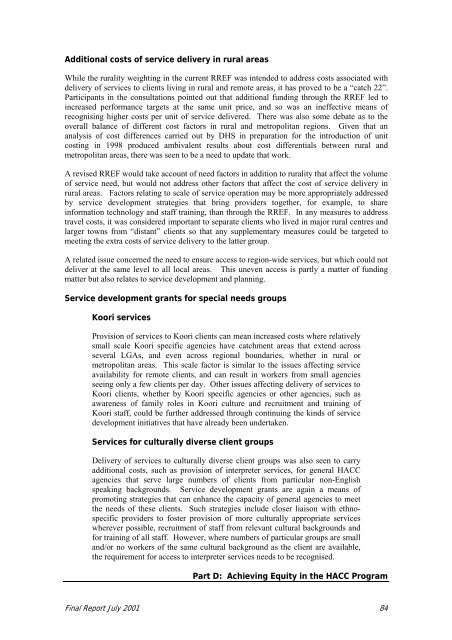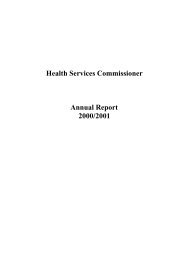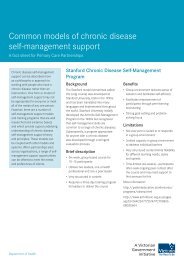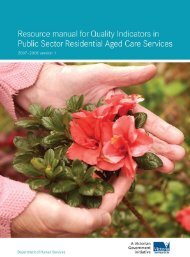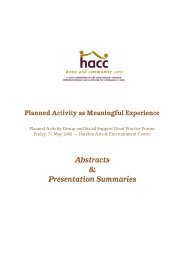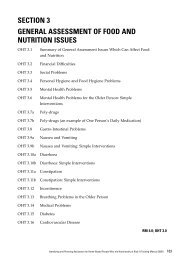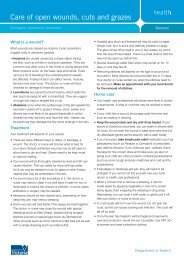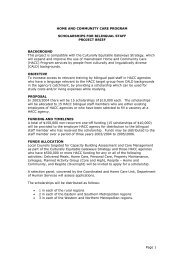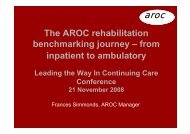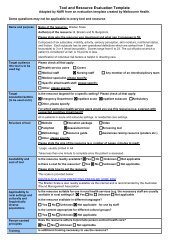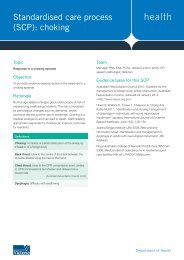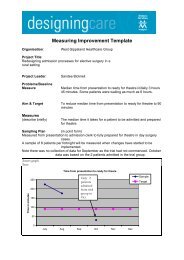Final Report on RREF 2001 - Department of Health
Final Report on RREF 2001 - Department of Health
Final Report on RREF 2001 - Department of Health
Create successful ePaper yourself
Turn your PDF publications into a flip-book with our unique Google optimized e-Paper software.
Additi<strong>on</strong>al costs <strong>of</strong> service delivery in rural areas<br />
While the rurality weighting in the current <strong>RREF</strong> was intended to address costs associated with<br />
delivery <strong>of</strong> services to clients living in rural and remote areas, it has proved to be a “catch 22”.<br />
Participants in the c<strong>on</strong>sultati<strong>on</strong>s pointed out that additi<strong>on</strong>al funding through the <strong>RREF</strong> led to<br />
increased performance targets at the same unit price, and so was an ineffective means <strong>of</strong><br />
recognising higher costs per unit <strong>of</strong> service delivered. There was also some debate as to the<br />
overall balance <strong>of</strong> different cost factors in rural and metropolitan regi<strong>on</strong>s. Given that an<br />
analysis <strong>of</strong> cost differences carried out by DHS in preparati<strong>on</strong> for the introducti<strong>on</strong> <strong>of</strong> unit<br />
costing in 1998 produced ambivalent results about cost differentials between rural and<br />
metropolitan areas, there was seen to be a need to update that work.<br />
A revised <strong>RREF</strong> would take account <strong>of</strong> need factors in additi<strong>on</strong> to rurality that affect the volume<br />
<strong>of</strong> service need, but would not address other factors that affect the cost <strong>of</strong> service delivery in<br />
rural areas. Factors relating to scale <strong>of</strong> service operati<strong>on</strong> may be more appropriately addressed<br />
by service development strategies that bring providers together, for example, to share<br />
informati<strong>on</strong> technology and staff training, than through the <strong>RREF</strong>. In any measures to address<br />
travel costs, it was c<strong>on</strong>sidered important to separate clients who lived in major rural centres and<br />
larger towns from “distant” clients so that any supplementary measures could be targeted to<br />
meeting the extra costs <strong>of</strong> service delivery to the latter group.<br />
A related issue c<strong>on</strong>cerned the need to ensure access to regi<strong>on</strong>-wide services, but which could not<br />
deliver at the same level to all local areas. This uneven access is partly a matter <strong>of</strong> funding<br />
matter but also relates to service development and planning.<br />
Service development grants for special needs groups<br />
Koori services<br />
Provisi<strong>on</strong> <strong>of</strong> services to Koori clients can mean increased costs where relatively<br />
small scale Koori specific agencies have catchment areas that extend across<br />
several LGAs, and even across regi<strong>on</strong>al boundaries, whether in rural or<br />
metropolitan areas. This scale factor is similar to the issues affecting service<br />
availability for remote clients, and can result in workers from small agencies<br />
seeing <strong>on</strong>ly a few clients per day. Other issues affecting delivery <strong>of</strong> services to<br />
Koori clients, whether by Koori specific agencies or other agencies, such as<br />
awareness <strong>of</strong> family roles in Koori culture and recruitment and training <strong>of</strong><br />
Koori staff, could be further addressed through c<strong>on</strong>tinuing the kinds <strong>of</strong> service<br />
development initiatives that have already been undertaken.<br />
Services for culturally diverse client groups<br />
Delivery <strong>of</strong> services to culturally diverse client groups was also seen to carry<br />
additi<strong>on</strong>al costs, such as provisi<strong>on</strong> <strong>of</strong> interpreter services, for general HACC<br />
agencies that serve large numbers <strong>of</strong> clients from particular n<strong>on</strong>-English<br />
speaking backgrounds. Service development grants are again a means <strong>of</strong><br />
promoting strategies that can enhance the capacity <strong>of</strong> general agencies to meet<br />
the needs <strong>of</strong> these clients. Such strategies include closer liais<strong>on</strong> with ethnospecific<br />
providers to foster provisi<strong>on</strong> <strong>of</strong> more culturally appropriate services<br />
wherever possible, recruitment <strong>of</strong> staff from relevant cultural backgrounds and<br />
for training <strong>of</strong> all staff. However, where numbers <strong>of</strong> particular groups are small<br />
and/or no workers <strong>of</strong> the same cultural background as the client are available,<br />
the requirement for access to interpreter services needs to be recognised.<br />
Part D: Achieving Equity in the HACC Program<br />
<str<strong>on</strong>g>Final</str<strong>on</strong>g> <str<strong>on</strong>g>Report</str<strong>on</strong>g> July <strong>2001</strong> 84


